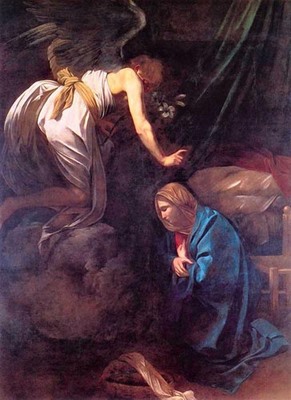SEARCH
 It was very much a Marian weekend for Pope Benedict XVI.
It was very much a Marian weekend for Pope Benedict XVI.
The Assumption reminds us that Mary's life, like that of every Christian is a journey to follow Jesus, a path that has a clearly defined goal, a future already mapped out: the final victory over sin and death and full communion with God.Referring to the Gospel of the day, in which Mary speaks with Elizabeth, and recites what has become known as the beautiful prayer the Magnificat, he said:
All of life is an ascent, all of life is meditation, obedience, trust and hope even in darkness and all of life is this sacred haste that knows that God is always the priority and nothing else should create haste in our lives.I love the expression sacred haste (and I don't think the Holy Father is talking about getting to Sunday Mass on time here!). It conjures up the image of our need to rush to God -- to urgently search and reach for God as it is only in Him that we will find our rest. It reminds me of Psalm 63, in which the Psalmist exclaims "Oh God you are my God, for you I long, my body pines for you!" An intense longing; an intense climbing towards. After Mass, the Pontiff held a special Angelus address at Castel Gandolfo’s inner courtyard. That was followed the next day by his regular Angelus address. Have you ever considered Mary's role in Jesus as the "living bread," or her role in the Eucharist? Here's an excerpt from the Angelus in which the Holy Father brings together Sunday's Gospel (John 6.51-58) and our Blessed Mother:
Jesus is presented as the living bread, that is the food that contains the very life of God… From whom did the Son of God take his flesh, his real and earthly humanity? He took it from the Virgin Mary. God took her human form to enter into our mortal condition. In turn, at the end of her earthly existence, the body of the Virgin Mary was assumed into heaven by God and allowed to enter the heavenly condition. It is a kind of exchange, in which God always has the initiative, but in a sense, in which he also needs Mary to prepare the matter of his sacrifice: the body and blood to be offered on the cross as an instrument of eternal life and in the Sacrament of the Eucharist as spiritual food and drink. What happened with Mary is also valid for every man and woman... God asks each one of us to welcome Him, to make available to Him our hearts, our bodies, our entire existence, so that He can dwell in the world. He calls us to unite ourselves to Him in the Sacrament of the Eucharist, to form the Church together…. And if we say yes, like Mary, by the very measure of our 'yes', that mysterious exchange also happens to and in us: we are assumed in the divinity of He who assumed our humanity.